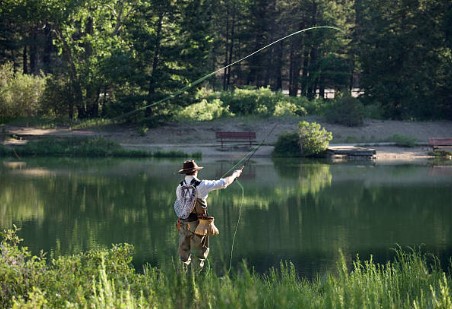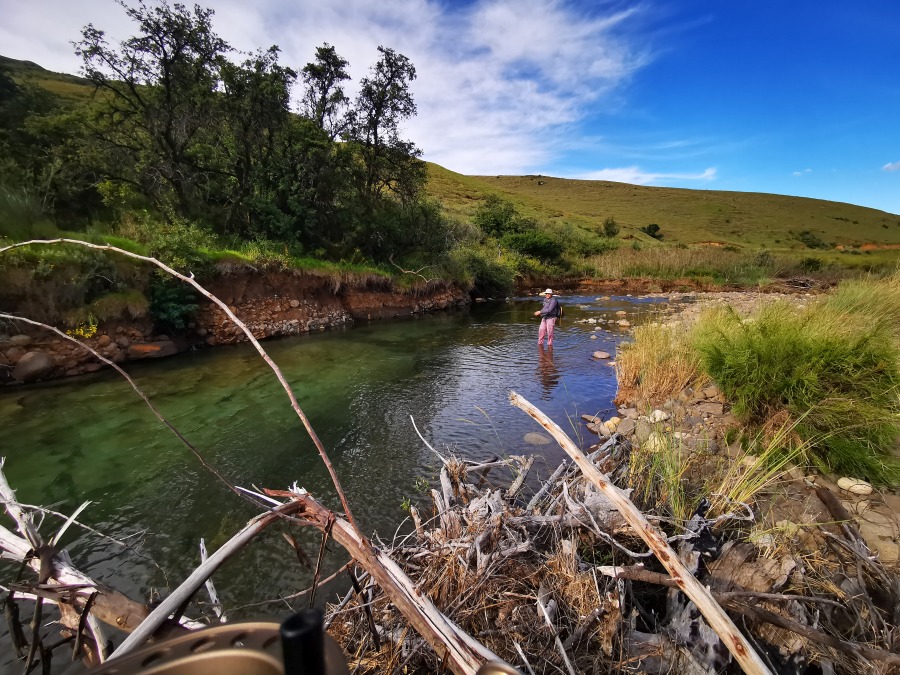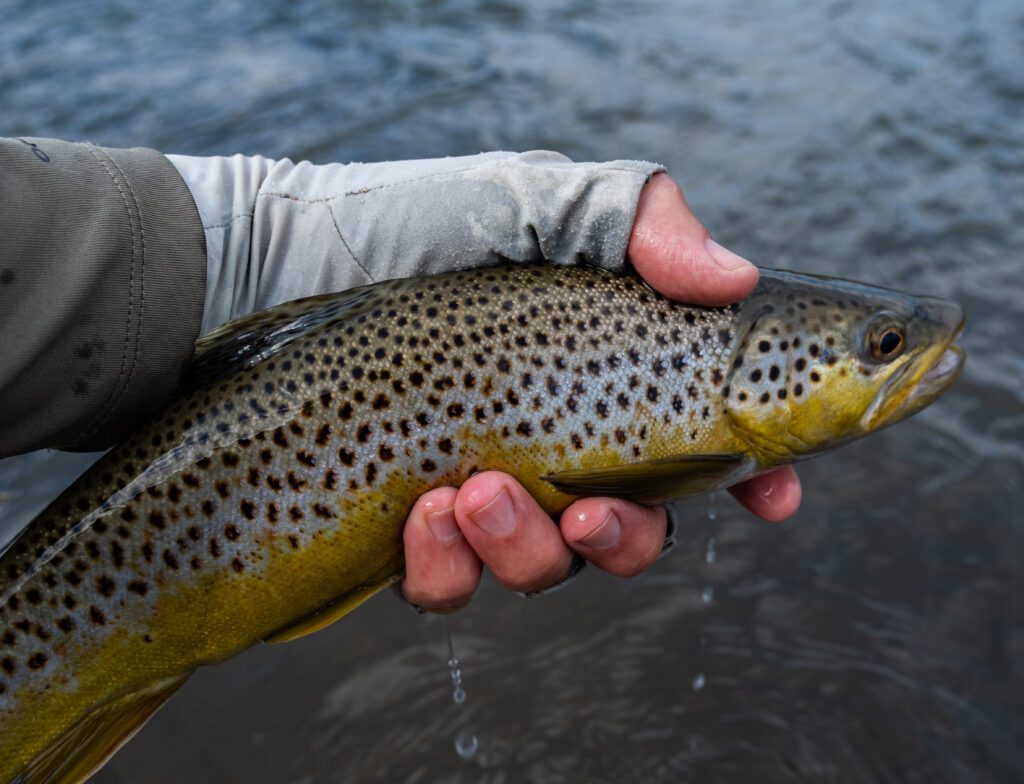There is an old adage which says that everything is created twice. Once in your imagination, and then in the execution. In other words before you make or do something, you picture how you want it to look, or have been executed, and then you work backwards to identify the steps required to get you to the outcome you imagined.
In other words, achieving outcomes requires imagination.
Conversely, a friend once proclaimed that a truck driver who takes his eighteen wheeler down a mountain pass at 100 miles an hour, lacks imagination. He is seemingly unable to imagine how that might end. Perhaps he has imagined himself sitting at home enjoying a post-work beer an hour earlier than scheduled, but an argument can still be made that he lacks a realistic imagination.

So when I see an angler standing atop a six foot vertical river bank in his white shirt, casting like someone on the set of a movie we once all watched, I can’t help thinking that he lacks realistic imagination. I mean, I know this guy, and he has read all the books I have read about stalking Trout. We have discussed YouTube videos where someone was leopard crawling through the brush to perform a bow and arrow cast. Has he somehow lost contact with that picture-book ending of the guy cradling the Brown Trout?
Perhaps he does still see the ending, but he has failed to work backwards and piece together the steps that might make him the successful, grinning angler in that final shot. The bloke who lifts the dripping fish for the camera.
Maybe he lacks the discipline to employ the shin-banging, wet-boot, nettle-stinging steps to get where he hopes to get. Maybe he has inspiration, but lacks the discipline. I recently saw a depiction of the different pace and endurance associated with inspiration on the one hand, and discipline on the other. The inspiration graph represented that ultra marathon runner, who surges three kilometers ahead in the first half hour of the race, and then peters out. The graph shows curves upwards, reaching a high apex, falling back and then reaching another apex, which is never as high as the first. Then the line goes flat and ends. The same line for discipline shows a steady sine wave of less impressive apexes, but ones which never waiver, and the line progresses off the right hand side of the page: the picture of consistency.
I wonder what the diagram representing the obsessed would look like.
I got to wondering how disciplined a fly fisherman I am. Or indeed how disciplined a person I am. Do I keep the pool clean right through winter, with summer swimming images firmly in mind? Ahem.
The dictionary definition I found of discipline (as it applies here) is “ An activity, exercise , or regimen that develops or improves a skill.” And elsewhere “behavior in accord with rules of conduct: behavior and order maintained by training and control.”
A psychologist I know once explained to me that there are two types of people when it comes to the sort of leisure activities they choose. The one type needs to lie on the couch and flick through the TV channels on the remote. Maybe fall asleep. Then only will they feel refreshed on Monday morning. The other type is one who needs to commit their mind to a non-work discipline in order to achieve escape. I place myself firmly in this category. If I were to lie on the couch, quite aside from the stiff back, my mind would wander to work, and I would be plain grumpy come Monday morning.
I think that dedicated fly-fishers are less likely to be the “lie on the couch” type. And at the risk of offending someone, I am sure that a river fisherman are entirely unlikely to fall into that category.
It occurs to me that a dedicated and successful fly fisher is probably one who has a regimen, built on a set of theories. A set of “Rules of conduct”. And I rather think that the regimen selected, and the theories adopted will be of less importance than the fact that a regimen has been adopted in the first place. In other words, there might be less importance than we think whether you fall in the “floating tippets scare fish” or the “sunk tippets scare fish” school of thought. How deeply you have immersed yourself into your school of thought, might well be the factor to which your success is more closely correlated. To support this notion, think of some successful anglers you know. I can bet that one of them will be a slave to the number of turns of ribbing on his chosen nymph, and the precise dye colour used in producing the tying silk. The next guy can’t be bothered with that, but he wears camo, takes his shining wedding ring off when he fishes and seldom pops his head over the bankside vegetation. The fly he is using is something he found in the cup holder in his bakkie, and its deployment will likely cause waves of nausea in the first fellow. Yet another will re-tie his entire tippet and fly every hour and after every fish. Discipline. Pick one.
Don’t be inspired. Be obsessed.
(“Obsession: the domination of one’s thoughts or feelings by a persistent idea, image, desire etc.”)
Attention to detail. (Whichever detail you believe is important)
And Imagination and discipline: Picturing the end result, and having the presence of mind to consistently observe the steps it will take to get there, whatever you might imagine those steps to be.
Oh, and do ditch the white T-shirt and earn some nettle stings.


3 Responses
Very nice, I believe that you are definitely “on to something” here. I would add but one caviat: that all the best anglers I have known, whilst obsessed, and exuding attention to detail from ever pore, maintain the ability to change their opinion and / or behavior should they be provided sufficiently compelling evidence to do so. It is, in the end, our “constantly inquiring mindset” which generally proves to be our most powerful asset.
Thanks Tim. Indeed….part of the allure of it all is cooking up and testing every theory under the sun. And I always have found your blog site a superb example of theories explored and unpacked and challenged! Best wishes.
Great piece, Andrew! My problem is that I don’t have enough of any of these traits to be a “successful fly fisherman” – as long as I have enjoyment – which cannot be avoided if you are fly fishing in our beautiful countryside!! Maybe that qualifies me to be classified as “successful” ??